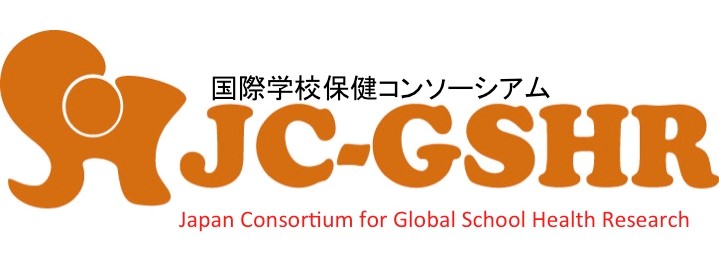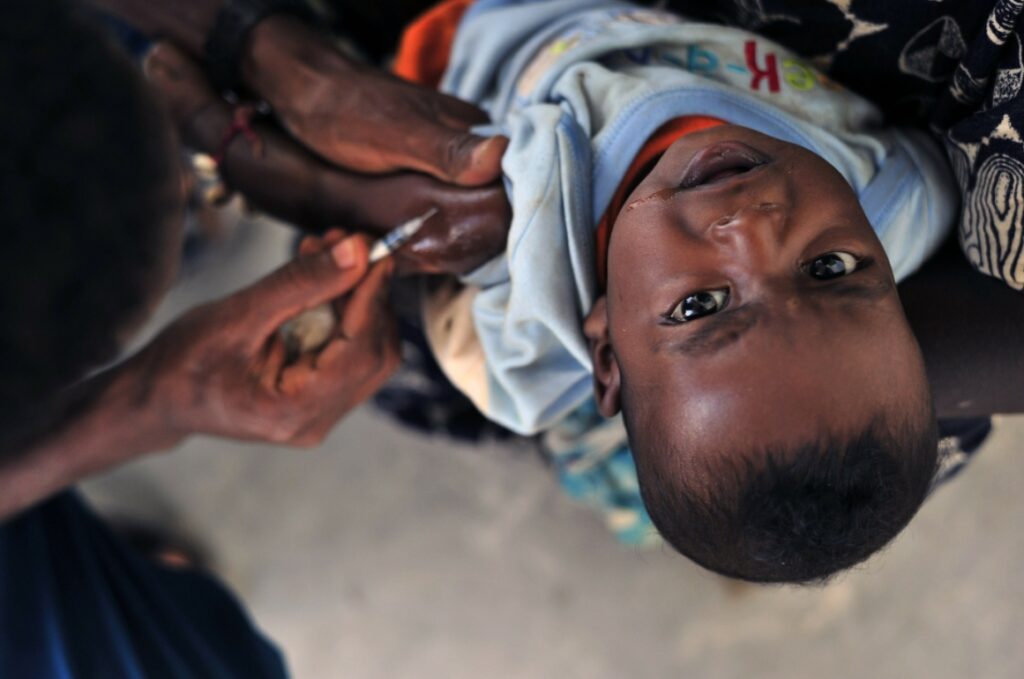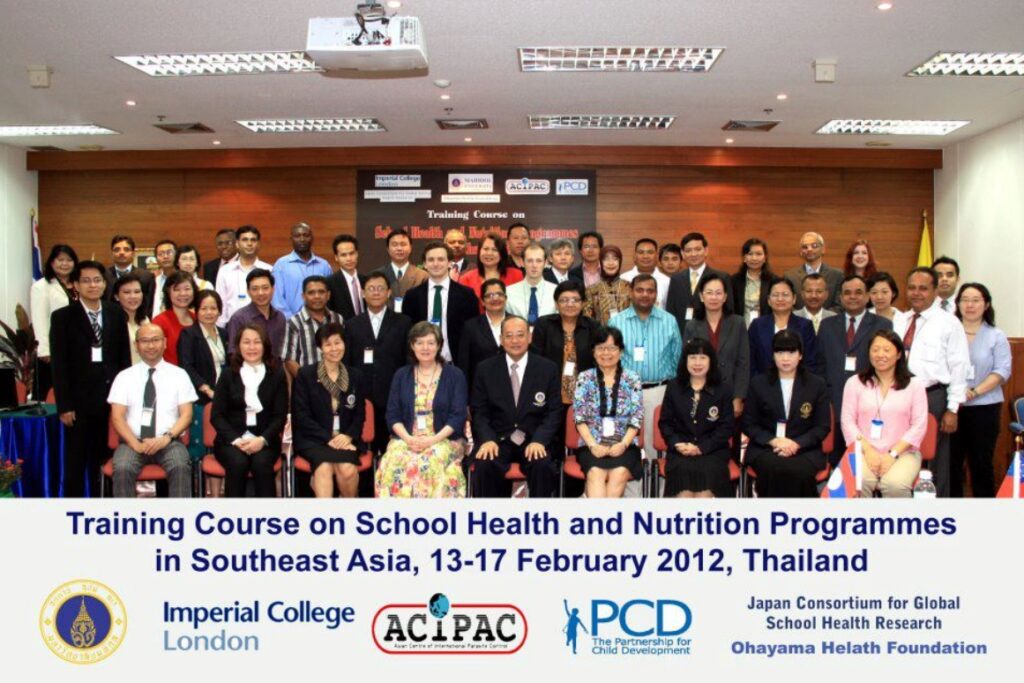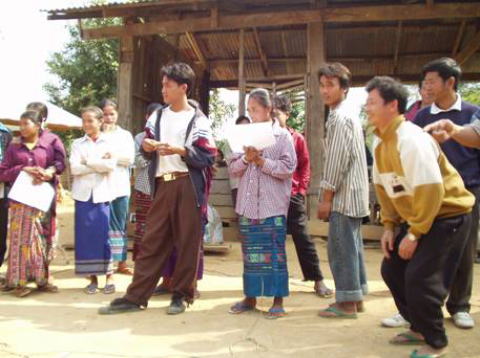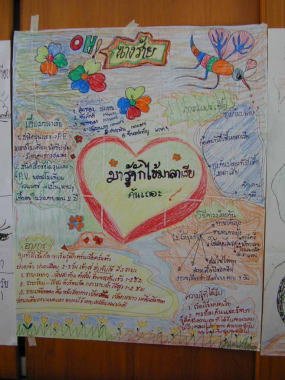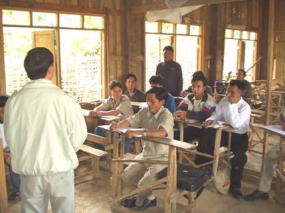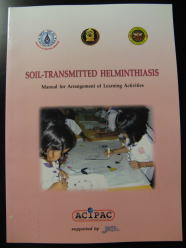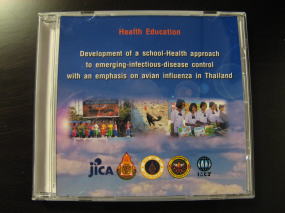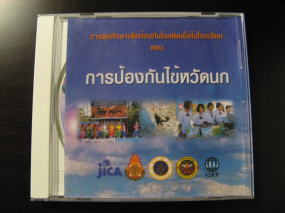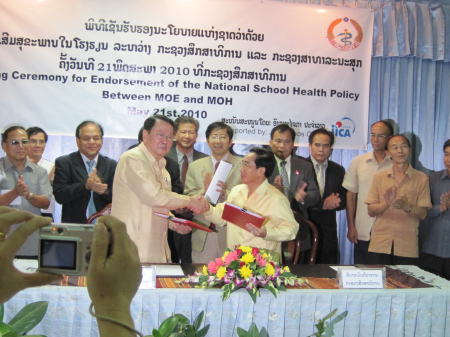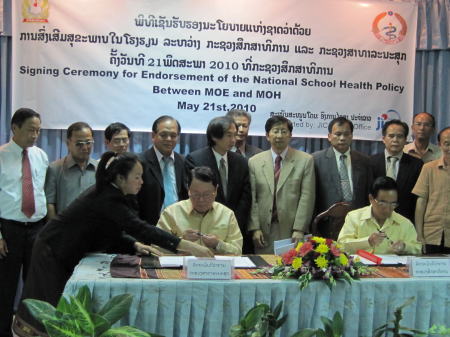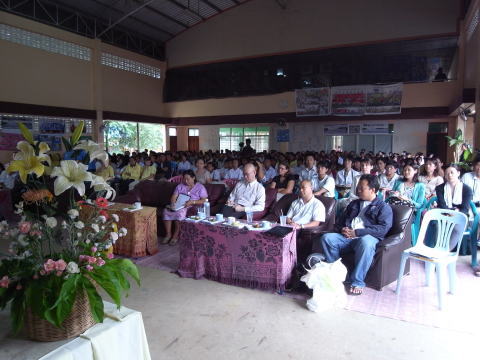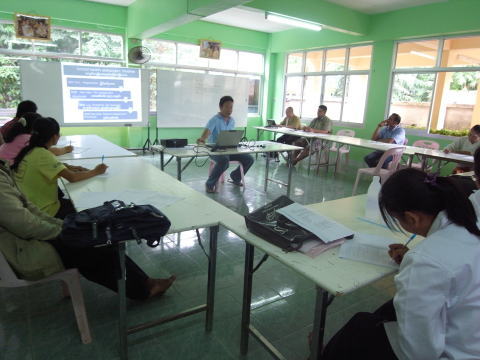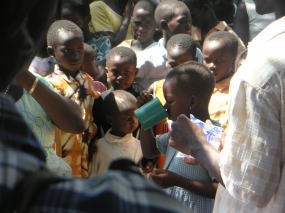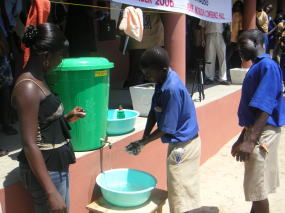Contents
- 1 Hashimoto Initiative
- 2 The Hashimoto Initiative -Global Level School Health Project
- 2.1 School health activity in Mekong Region
- 2.2 Major activities and achivement
- 2.2.1 Ⅰ.Human Development
- 2.2.2 Ⅱ.Small-scale pilot project (SSPP) - Malaria and Soil-transmitted Helminthiases Control
- 2.2.3 Ⅱ-1. SSPP activities in each country
- 2.2.4 Ⅱ-2. Teaching materials developed by ACIPAC
- 2.2.5 Ⅱ-3. Schoolhealth based malaria control
- 2.2.6 Ⅲ.Deployment of comprehensive school health approach
- 2.2.7 Ⅲ-1. Development of school health supervising organization
- 2.2.8 Ⅲ-2. Development of school health policies in Laos and Cambodia
- 2.2.9 Ⅲ-3. Development of monitoring and assessment system
- 2.2.10 Example) Burmese Migrant Schools
- 2.2.11 Ⅳ. Publications
- 3 School health project in Western Africa
Hashimoto Initiative
The Hashimoto Initiative -Global Level School Health Project
At the 1998 G8 Summit in Birmingham, England, then Prime Minister Hashimoto was central to speaking to the necessity of the G8 countries working toward global measures to control parasites (Hashimoto Initiative). Subsequently, with the assistance of JICA, International Parasite Control Centers were established in Thailand, Kenya and Ghana, which contributed not only to the implementation of parasite control measures, but also extension of school health globally, providing an infrastructure for putting such measures into practice. After JICA’s assistance was concluded, JC-GSHR carried on the Hashimoto Initiative and developed activities with Japan as a focal point.
Establishment of Parasite Control Center

In 1997 and 1998, on the occasion of the G8 countries’summit at Denver and Birmingham, respectively, the then-Prime Minister of Japan, Ryutaro Hashimoto, pointed out the importance of parasitic diseases control in the improvement of public health and proposed the necessity of strengthening international cooperation toward global parasite control (so-called Hashimoto Initiative). Malaria, schistosomiasis and some other bacterial infection or parasitic diseases still remains as major health hazards to the health of the people living in tropical developing countries mainly in Asian and African areas. Eventhough the mortality from these diseases is not so high, it has serious impact on the people's everyday life. It is estimated that more than a billion people around the world mostly living in tropical area and among the poor are infected by some kind of bacterial infection and/or parasitic diseases and many are children of schoolage. Moreover, with the progress of globalization, impacts deriving from these diseases are not limited to health matters but recognized as major factor of inihibiting economic and social development and regarded as one of the major issue of achieving global poverty reduction.
Under the Hashimoto Initiative, three organizations of global parasite control promoted by the Japanese Government were established as a base of human resource development and strengthening human resource and information networking in developing countries:
History and Background of Establishment of Parasite Control Centers
ACIPAC
2001: Asian Center of International Parasite Control (ACIPAC) established at Faculty of Medicine, Mahidol University in Thailand
Participating countries: Cambodia, Laos, Myanmar, Thailand, Vietnam
ESACIPAC
2001: Eastern and Southern Center of International Parasite Control (ESACIPAC) established at Kenya Medical Research Institute (KEMRI)
Established at Kenya Medical Research Institute (KEMRI)
Participating countries: Kenya, Sudan, Tanzania, Malawi, Swaziland and Rwanda
WACIPAC
2004: West African Center for International Parasite Control (WACIPAC) established at the Noguchi Memorial Institute for Medical Research and University of Ghana
Participating countries: Benin, Burkina Faso, Cameroon, Cote d'Ivoire, Ghana, Mali, Niger, Nigeria, Senegal, Togo
The centers have produced many talented individuals instrumental in school health policy management in partner countries. In 2008, the JICA project, which provided assistance to the CIPACs (ACIPAC, ESACIPAC and WACIPAC), concluded and its operations were handed over to the respective counterpart institutions. At the time of the project’s conclusion, high regard had been afforded not only for the widespread measures to control soil-borne parasites, upon which school health is based, but also for creation of a school health infrastructure in each partner nation. It was particularly notable that partner nations’ education and health ministries had begun to collaborate in CIPACs efforts, and school health programs had been initiated as national policy in these countries.
Also, under the Hashimoto Initiative, the WHO took the lead with other organizations involved in tropical disease control to consolidate measures for addressing Neglected Tropical Diseases (NTD), diseases caused by 17 chronically rampant parasites and bacterial infections, in addition to the three major infections (AIDS, tuberculosis and malaria (ATM)). Together with departments responsible for addressing AIDS, tuberculosis and malaria, the WHO Headquarters launched the NTD Department, which held an international conference on NTDs in April 2007. Even today, these efforts continue on a global scale.
CIPACs Today
In collaboration with Partnership for Child Development (PCD), an international school health think tank based at Imperial College London in the United Kingdom, the Japan Consortium for Global School Health Research conferred with ACIPAC, headquartered at the Faculty of Tropical Medicine of Mahidol University in Thailand, and other relevant organizations in 2011 to confirm the necessity of training personnel so that they are able to address new issues in school health. This led to the re-commencement in 2012 of international school health and nutrition training, which is currently being provided to NGO program managers, UN personnel as well as officials of participating counties’ education and health ministries. The training is offered on a fee basis. Participants have hailed not only from the Mekong region, which is where ACIPAC partner countries are located, but also a broader swath of countries having an intermediate or lower standard of living in southeast and southern Asia. The value of this training has been widely recognized. Because nutrition measures, an important part of school health in developing countries, have simply worked to expand deworming programs to counter soil-borne parasites, there has been a shift toward ensuring their continuity and formulating a course to conclude such programs as well as toward developing school-based feeding and lunches. Furthermore, even in developing countries, the issues addressed in school health range broadly and include lifestyle-related illnesses arising due to hypernutrition, mental health and other non-communicable diseases, alcoholism, drug use, violence and trauma in addition to ever-increasing disaster prevention measures, and training has been developed to respond to these needs.
ESACIPAC and WACIPAC have also continued to develop school health training in Africa. At a 2015 WHO school health technical meeting held in Bangkok Thailand where ACIPAC is located, there was a reconfirmation of Africa as a focal point. The Japan Consortium for Global School Health Research has also continued to contribute to joint research and deployed instructors for training.
The Hashimoto Initiative -Global Level School Health Project
School health activity in Mekong Region
The Asian Center of International Parasite Control (ACIPAC) was established as a Japan International Cooperation Agency (JICA) project under an agreement of Hashimoto Initiative between the Governments of the Kingdom of Thailand and Japan, ended its five-year term on 22 March 2005. The major objective of the ACIPAC activity was the Human resources development (HRD). The project suggested a school health approach "School-based parasite control togather with children as a partner." and to realize this, the approach had to be disseminated and understood by all school health practitioners in the region. ACIPAC held international training courses of school-based malaria and soil-transmitted helminthiases control for program managers who were from central and provincial levels of the Greater Mekong Sub-region: Cambodia, Lao PDR, Myanmar, Thailand, and Vietnam (CLMTV). The training course was designed for the participantes to implement school-based approach for parasite control in these regions, especially for controling soil-transmitted helminthes and malaria. To support the school-based parasite control, ACIPAC also provided support on the coordination between Health and Education Sectors and development of the national taskforce/policy, life-skill education and community partnership, in collaboration with international organizations such as WHO, UNICEF and UNESCO. ACIPAC considered school children as health partners and developed a strategy using the participatory learning action (PLA) approach for school-based parasite control, which made the children learn by themselves with higher motivation. They also played a role as health messengers to change behaviors among the villagers, using IEC (Information, Education, Communication) tools. This was a new strategy for these regions.
The ACIPAC project ended in march 2005 successfully with big achievement in promotion of school-based parasite control and human resource development. At present, ACIPAC is providing continous support on developing school health module, improving promotion skills, enhancing South-South cooperation, and strengthening management function of International Cooperation Unit of Faculty of Tropical Medicine, Mahidol University.
Major activities and achivement
Many Malaria and parasite control initiatives in developing countries are more likely to face shortage of human and financial resource. To address this issue, ACIPAC paid attention to school-based parasite control as cost-effective and sustainable approach. School children had not been given greater emphasis on malaria control compared to pregnant women and under 5-year old children for long time. However, as school children could be a major source of infection in the community, school-based malaria control was expected to be an effective approach of preventing epidemic diseases in the community. In Thailand and neighboring countries, high prevalence of soil-transmitted helminthiases (STH) was found among school children, especially in mountainous areas. It is important for schools to incorporate the school health approach or framework such as Health Promotion Schools (HPS) or FRESH in the usual health education. Despite of challenging situation such the fact that few government emphasize school health as important topic and since it require considerable time to gain possitive result, school-based parasite control made a great success in five countries: Cambodia, Lao PDR, Myanmar, Thailand, and Vietnam (CLMTV)in the Greater Mekong Sub-region (GMS).
Ⅰ.Human Development
To promote the school-based approach for parasite control with children as a partner, ACIPAC hold a international training course, "School-based Malaria and Soil-transmitted Helminthiases Control" every year from 2001 in Bangkok, Thailand. The participants were program managers of parasite control project from central and provincial levels of the Greater Mekong Sub-region: Cambodia, Lao PDR, Myanmar, Thailand, and Vietnam (CLMTV).
The 12-weeks training curriculum was originally drafted by committee members from the institutions in Thailand including Mahidol University; Department of Communicable Disease Control, Ministry of Public Health; and the Office of Basic Education Commission, Ministry of Education. During the training course, each participant developed a proposal of a school-based parasite control project which they would conduct when they returned to their home country. This proposed projects was called Small Scale Pilot Project (SSPP) which was considered one of the key activity in ACIPAC. The purpose of SSPP was to practice the knowledge gained during the training course at the respective countries. More than 100 trainees from eight countries participated the training course in four years. Their knowledge increased after the training and were highly satisfied with the training. Nearly 90% of graduates continued to be involved in school-based parasite control, which is effective for sustainable implementation of school-based parasite control in each region.
During the training course, International Symposium for Parasite control was also held to provide an opportunity for participants from different countries to discuss and share information on their activities.
Ⅱ.Small-scale pilot project (SSPP) - Malaria and Soil-transmitted Helminthiases Control
SSPP were carried out in each of the CLMV countries by the graduates of the ACIPAC international training course to practice their project proposals developed at the training course and to further develop their management skills. With support from the health officials of each countries, project started targeting two to three pilot elementary schools and expanded the target to the elementary schools in surrounding areas. In addition to the treatment of soil-transmitted helminthiases, initial activity was to provide a health education to school children so that they could see, think and plan from their own standpoint followed by the Malaria control program. Expecting that SSPP model would be created by each country considering their actual situation, SSPP basic strategy revised in 2003 is below;
Ⅱ-1. SSPP activities in each country
Thailand (Nakhon Si Thamarat Province, Ratchaburi Province)
- 小学校教師
- Developed educational manual for elementary school teachers and textbook for students on malaria and soil-transmitted helminthiases
- Provided training to teachers in the model province
- Established malaria/soil-transmitted helminthiases control committee in each school.
- Implemented malaria education as a part of school curriculum.
- Students' field activity including mosquito study and coummunity resident interview.
- Students played a role of promoter to promote health information to family members and community residents. (Issued newsletters, placed a message board in the coummnity, hold heath event)
Teachers were aware of importance of malaria education before SSPP implementation however due to lack of school curriculum and education tool, it was not broadly implemented. After SSPP implementation, school health approach was recognized by both education and health authorities which led to proactive practice of malaria education and students have changed their behavior toward malaria conrol accordingly. Moreover, ACIPAC's educational tool of soil-transmitted helminthiases control used in model schools was translated and adopted in broader area including neighboring countries of Thailand, Kenya, East Timor and other international organization (eg.NGO).
Cambodia
- Provided selective therapy (2002) and blanket therapy (2003)
twice a year to students diagnosed as positive stool (2002) - Conducted parasite control lecture using posters.
- Weekly broadcasting of radio program on health education at schools.
- Implemented health education curriculum incorporating child-to-child approach.
Selected senior students attended two-day hygiene education program.- Students who attended the hygiene education program disseminated hygiene control and parasite disease prevention by creating a story or/and illustrations
- Students who attended the education program also disseminate malaria and soil-transmitted helminthiases control to people in the community using illustrated posters.
- Built public restroom
Laos
- Provided selective therapy to students diagnosed as positive stool.
- Promoted knowledge of soil-transmitted helminthiasies control to teachers
- Inplemented practical education to change students' behavior (e.g. wash hands before eating) for preventing the outbreak of soil-transmitted helminthiasies
- Established water supply system in schools partly funded by the people in the community.
Myanmar
- 便陽
- Implemented health education lesson in lifeskill curriculum
- Implemented one hour sesson of soil-transmitted helminthiases control education
- Conducted deworming campaine under WHO support
Vietnam
- Provided community treatment of soil-transmitted helminthiases twice a year.
- Provided soil-transmitted helminthiases control education as a topic of health education in the curriculum once a month.
- conducted health promotion campaine at model schools. (Health education through game, story telling and roleplay)
- Vietnam ministry of education distributed IEC kit for health education to schools nationwide.
- Radio broadcasting on health education aired in communities.
This effective and efficient strategy to implement the same concept by considering the situation of each country showed successful result. The result showed decreased incidence of soil-transmitted helminthiases outbreak, improved knowledge on preventing parasitic infection and change in hygienic behavior. Moreover, teachers' teaching ability and students' life skill ability was also improved. Launching SSPP made a major contribution in forming a taskforce among education and health sectors, establishing partnership between donors, developing a strategy of malaria education, and formulating national policy on school health. Through the project, ministries, donors and related organizations of five nations in Mekong area shared recognition on the advantage of school health activities for malaria and parasitic infection control and the importance of formulating nation level school health policy with implementation of comprehensive school health approach in each school with health and education sector's support.
Ⅱ-2. Teaching materials developed by ACIPAC
Ⅱ-3. Schoolhealth based malaria control
When the ACIPAC project kicked off, major target of malaria control were pregnant women and children under 5-year old and school based malaria control was not recognized as effective strategy at that time. However in 2003, ACIPAC implemented the Participatory Learning Action (PLA) approach as school based malaria education which school children would be a health partner to actively promote malaria control in the community rather than to be a passive learner of health education. In Thailand, this approach was incorporated in education ministry’s malaria education curriculum for hazardous area. In Cambodia, malaria education was included as part of global fund strategy based on research student’s advice. In Laos, malaria education was included in health education material, so called IEC Kit and implementing the PLA approach at schools resulted in change of people’s behavior in the communities. In Myanmar, health sector raised attention to the school based malaria education by implementing the project in model schools.
In 2005, ACIPAC presented the successful result of school based malaria control at the WHO general assembly and involvement of education sector was added to the WHO’s malaria control strategy thereafter. School based malaria control was recognized as global malaria control strategy recommended by Asian countries. School health approach is also included in Word Bank’s malaria control strategy.
On the other hand, a research finding released in 2008 shows that intermittent preventive treatment for 5 to 18 year old school children in malaria hazardous area of Kenya resulted in decrease of anemia rate and improvement of concentration in classroom. This may lead to the suggestion that effective malaria control may differ by malaria epidemic situation in each country or area.
(Clarke SE, Jukes MC, Njagi JK, Khasakhala L, Cundill B, Otido J, et al. Effect of intermittent preventive treatment of malaria on health and education in schoolchildren: a cluster-randomised, double-blind, placebo-controlled trial. Lancet 2008 Jul 12;372(9633):127-138.)
Ⅲ.Deployment of comprehensive school health approach
Ⅲ-1. Development of school health supervising organization
Combining Japan’s past experience of parasite control and idea of health promotion school, ACIPAC is recommending and conducting comprehensive school health approach which include providing education which enhance school children’s life skills and supporting school health policy development along with healthcare service of anthelmintic administration and improving the health environment. As a baseline, ACIPAC has been playing a key role of global network-building and building internal and external partnership among the concerned parties including research trainees, relevant ministries, international authorities, donors and NGOs. On top of this role, ACIPAC has been establishing a parent organization of school health approach with ministries of education and health in each country. Development of comprehensive school health system which ACIPAC has been promoting has a potential that can be applied to HIV/AIDS and tuberculosis control.
Ⅲ-2. Development of school health policies in Laos and Cambodia
Laos
Revised version of Laos school health policy has been finalized and signing ceremony was hold with the minister of health and the minister of education on May 21, 2010.
Ⅲ-3. Development of monitoring and assessment system
Example) Burmese Migrant Schools
A large number of Burmese migrants live in Thailand. The children of those migrants and child migrants have limited access to social services, such as education and health. Little quantitative data about their situation is available. They are considered to be a vulnerable group in the society. However, they have not been the focus of research for long time.
Tak province is one of the major entry points of migrants from Myanmar. This province has a large population of Burmese migrant. The fear of deportation, difference of language and curriculum are the barrier for the children of migrants to study in Thai schools. Therefore Burmese migrant schools, which were established by local migrant community and organizations, provide education to these children. In 2008, 54 migrant schools enrolled about 8,000 students in Tak province. However, the activity of health promoting School of Thailand has not covered these Burmese migrant schools.
In an attempt to improve the situation of school health among these Burmese migrant schools in Thailand, we conducted an intervention and evaluated its performance.
We developed a comprehensive school-health checklist for measuring the performance of Burmese migrant schools in Thailand. The checklist consisted of five components: component 1 (personal health and life skills, 12 items); component 2 (healthy school environment, 22 items); component 3 (health and nutrition services, 13 items); component 4 (common disease control and prevention, 7 items); and component 5 (partnership with community, 6 items). Research teams, consisting of two research staff members, visited schools and collected data.
Furthermore, as an intervention to improve school health in Burmese migrant schools, one-day training workshops were held between July and August 2008 for six times. To evaluate the progress of the 43 schools, the second survey was conducted in February 2009. As a result, almost all schools improved in the scores of the checklist from the previous year. Using the results of the survey, an awarding system was introduced. We set the criteria to certificate gold, silver, and bronze level schools. In July 2009, seven schools were certificated as bronze level. Then an awarding ceremony was held by the cooperation with the local migrant communities and organizations.
In conclusion, those activities enabled the first evaluation of school health in Burmese migrant schools. It was an important opportunity for migrant schools to know and improve the situation of school health in their school. Currently, we are trying to establish a self-assessment he system in this Burmese migrant community.
Ⅳ. Publications
Yoshimura N, Jimba M, Poudel KC, Chanthavisouk C, Iwamoto A, Phommasack B, et al. Health promoting schools in urban, semi-urban and rural Lao PDR. Health.Promot.Int. 2009 Jun;24(2):166-176.
Nonaka D, Kobayashi J, Jimba M, Vilaysouk B, Tsukamoto K, Kano S, et al. Malaria education from school to community in Oudomxay province, Lao PDR. Parasitol.Int. 2008 Mar;57(1):76-82.
Takeuchi T, Nozaki S, Crump A. Past Japanese successes show the way to accomplish future goals. Trends Parasitol. 2007 Jun;23(6):260-267.
Kojima S, Aoki Y, Ohta N, Tateno S, Takeuchi T. School-health-based parasite control initiatives: extending successful Japanese policies to Asia and Africa. Trends Parasitol. 2007 Feb;23(2):54-57.
Kobayashi J, Jimba M, Okabayashi H, Singhasivanon P, Waikagul J. Beyond deworming: the promotion of school-health-based interventions by Japan. Trends Parasitol. 2007 Jan;23(1):25-29.
Okabayashi H, Thongthien P, Singhasvanon P, Waikagul J, Looareesuwan S, Jimba M, et al. Keys to success for a school-based malaria control program in primary schools in Thailand. Parasitol.Int. 2006 Jun;55(2):121-126.
Kojima S, Takeuchi T. Global parasite control initiative of Japan (Hashimoto Initiative). Parasitol.Int. 2006;55 Suppl:S293-6.
Kojima S, Looareesuwan S, Singhasivanon P, Takeuchi T. The Asian center of international parasite control (ACIPAC): five years of achievement. I. Introduction. Southeast Asian J.Trop.Med.Public Health 2005;36 Suppl 3:1-12.
Waikagul J, Singhasivanon P, Supavej S, Rojekittikhun W, Suphadtanaphongs W, Leemingswat S, et al. The Asian Center of International Parasite Control (ACIPAC): five years of achievement. II. ACIPAC human resources development. Southeast Asian J.Trop.Med.Public Health 2005;36 Suppl 3:13-16.
Joongsuksuntigul P, Thongthien P, Sirichotiratana N, Okabayashi H, Jimba M. The Asian Center of International Parasite Control (ACIPAC): five years of achievement. III. School health for parasite control in Thailand: a review and current model activities. Southeast Asian J.Trop.Med.Public Health 2005;36 Suppl 3:17-27.
Kabayashi J, Socheat D, Phommasack B, Tun A, Nga NH. The Asian Center of International Parasite Control (ACIPAC): five years of achievement. IV. Activities in partner countries (Cambodia, Lao PDR, Myanmar and Vietnam): small scale pilot project (SSPP) and other impacts. Southeast Asian J.Trop.Med.Public Health 2005;36 Suppl 3:28-40.
The Asian Center of International Parasite Control (ACIPAC): five years of achievement. V. Evaluation of the ACIPAC project. Southeast Asian J.Trop.Med.Public Health 2005;36 Suppl 3:41-73.
Tomono N, Anantaphruti MT, Jongsuksuntigul P, Thongthien P, Leerapan P, Silapharatsamee Y, et al. Risk factors of helminthiases among schoolchildren in southern Thailand. Southeast Asian J.Trop.Med.Public Health 2003 Jun;34(2):264-268.
Anantaphruti MT, Jongsuksuntigul P, Imsomboon T, Nagai N, Muennoo C, Saguankiat S, et al. School-based helminthiases control: I. A baseline study of soil-transmitted helminthiases in Nakhon Si Thammarat Province, Thailand. Southeast Asian J.Trop.Med.Public Health 2002;33 Suppl 3:113-119.
School health project in Western Africa
Under Japan’s international parasite control initiative (Hashimoto Initiative), West African Centre for International Parasite Control (WACIPAC) was established in 2004 as 5 year project based in Noguchi Memorial Institute for Medical Research, Ghana and University of Ghana. The major objectives of the WACIPAC activity were development of parasite control model through school health approach, providing trainings and workshops and information network building. The activity was mainly focused on Ghana, Benin and Niger where international workshop and trainings were held for resource development inviting program managers of health and education ministries from surrounding countries.
At project completion in 2008, school health policy was formulated and with involvement of health and education sectors, cross-sectoral school health system was established. Since widespread west african area is covered by the project, technical support and information sharing was available multilaterally which made easier to develop school health policy and strategy in each countries compared to bilateral assistance.
In January 2008, WACIPAC was officially merged into WAHO (West African Health Organization) to promote its’ self-sustaining development and urging other 6 non-member countries to gain their support.
Ⅰ. Human Development
During the project, international workshop were held twice inviting program managers of health and education ministries from surrounding countries to share common understandings on parasite control promotion. Furthermore aiming to gain knowledge and technique of school health based parasite control, five international trainings for parasite control and enhancement of school health strategy were provided to program managers and policymakers from the member countries and over 100 people participated. Follow-up visits were conducted total of 16 times for training participants to support parasite control activities in member nations which are appreciated by those nations.
Ⅱ. Impact
Ⅲ-1. Development of school health supervising organization
From 2006 ACIPAC experiences have been shared to WACIPAC and under the idea of the Health Promoting School, mass deworming and health education through school health activities (bilharziasis, soil-transmitted helminthiases and malaria controls) were conducted at model schools together with development of IEC tool. In Ghana, Benin and Niger, national level promotion going on based on the WACIPAC’s deworming model and school self-assessment sheet. For those other member countries, establishment of interministerial committee, deworming program and formulation of school health policy and guideline have been promoted. Furthermore, ACIPAC has provided support to 10 member countries on establishing school health management system as a national program and in Nigeria, Senegal Benin and Niger, national level school health project has kicked off based on the formulated national school health policy in each country.
Ⅲ-2. Development of school health policies in Benin and Niger
Benin
A school health policy document has been established in 2006 by health minister and education minister who participated in the international training sessions. Framework of interaction between development partner and small-scale organization supported by WACIPAC has been developed. Currently planning nationwide deployment of soil-transmitted helminthiases control model which was created in Dambo area.
Niger
National level school health policy formulated by research student of WACIPAC. Environment specified self-assessment method was distributed to 2 prefectures and improvement of environment has been reported.
